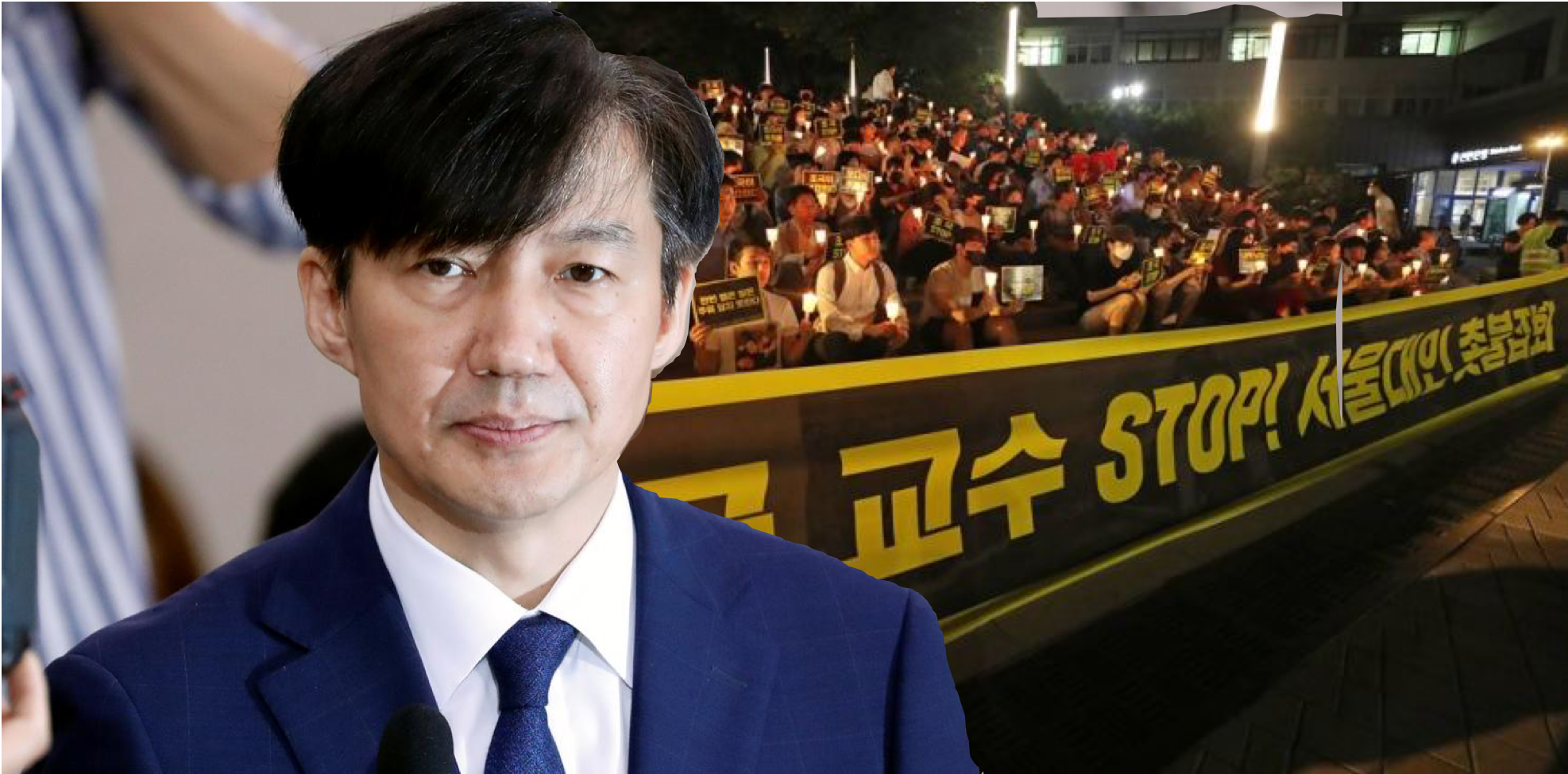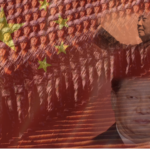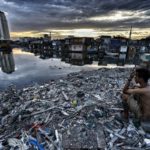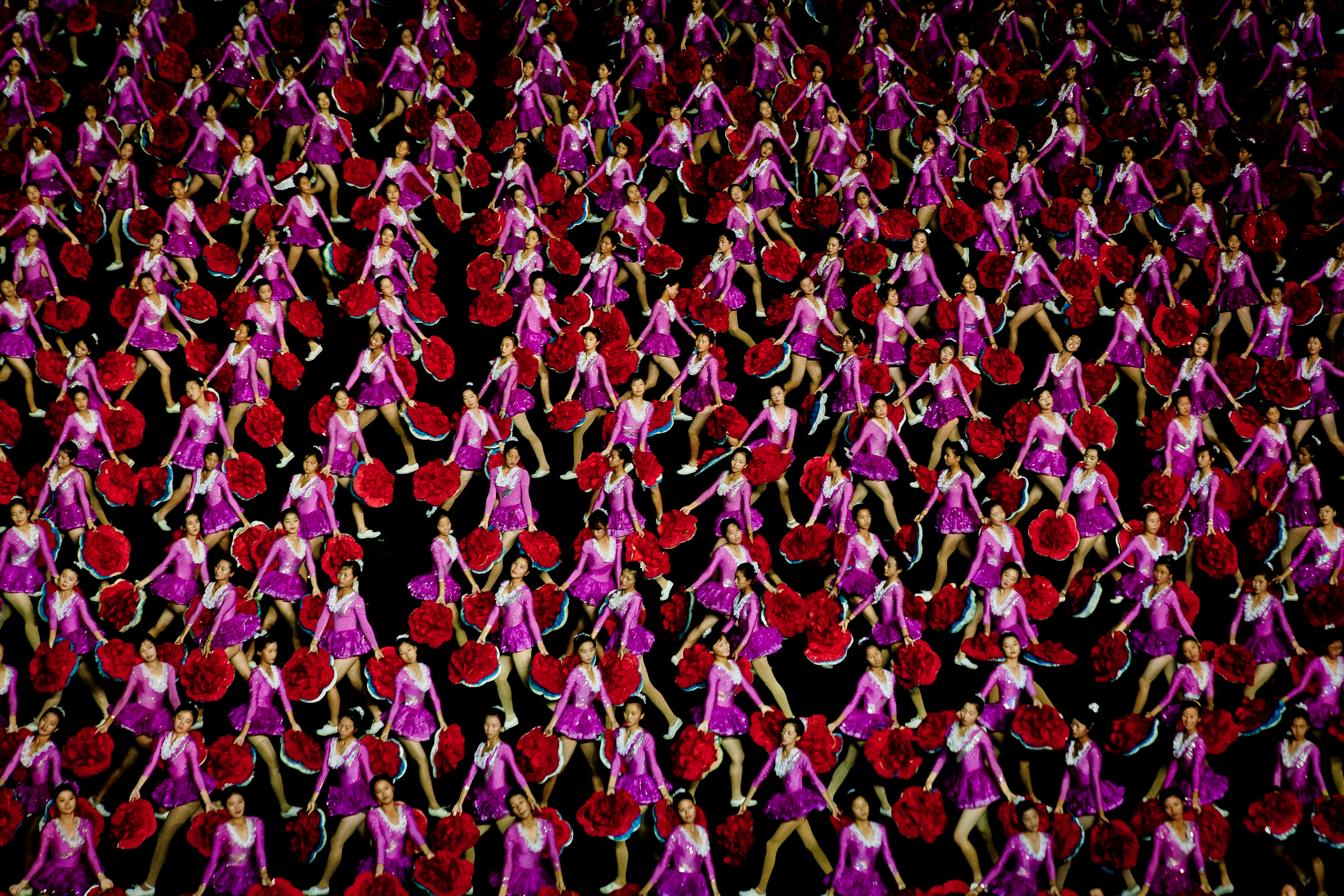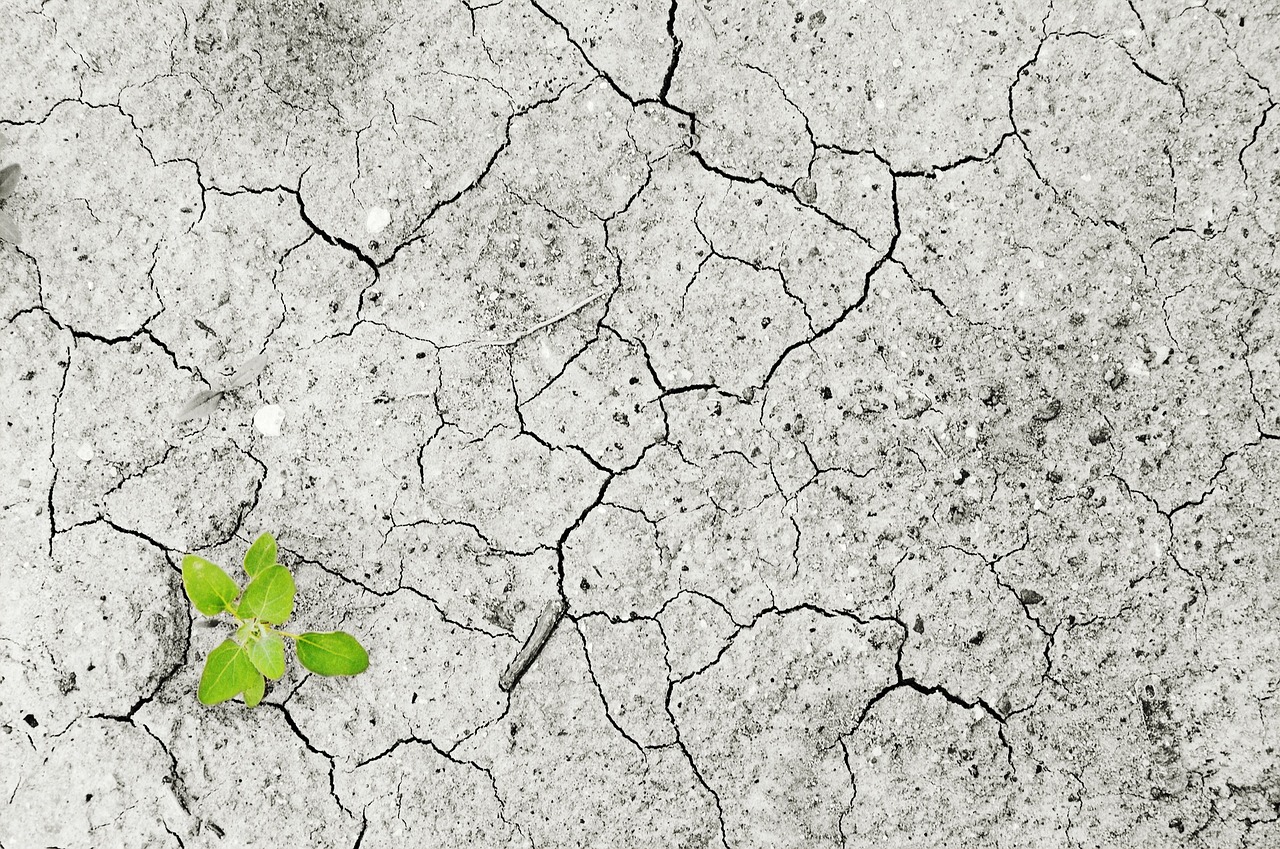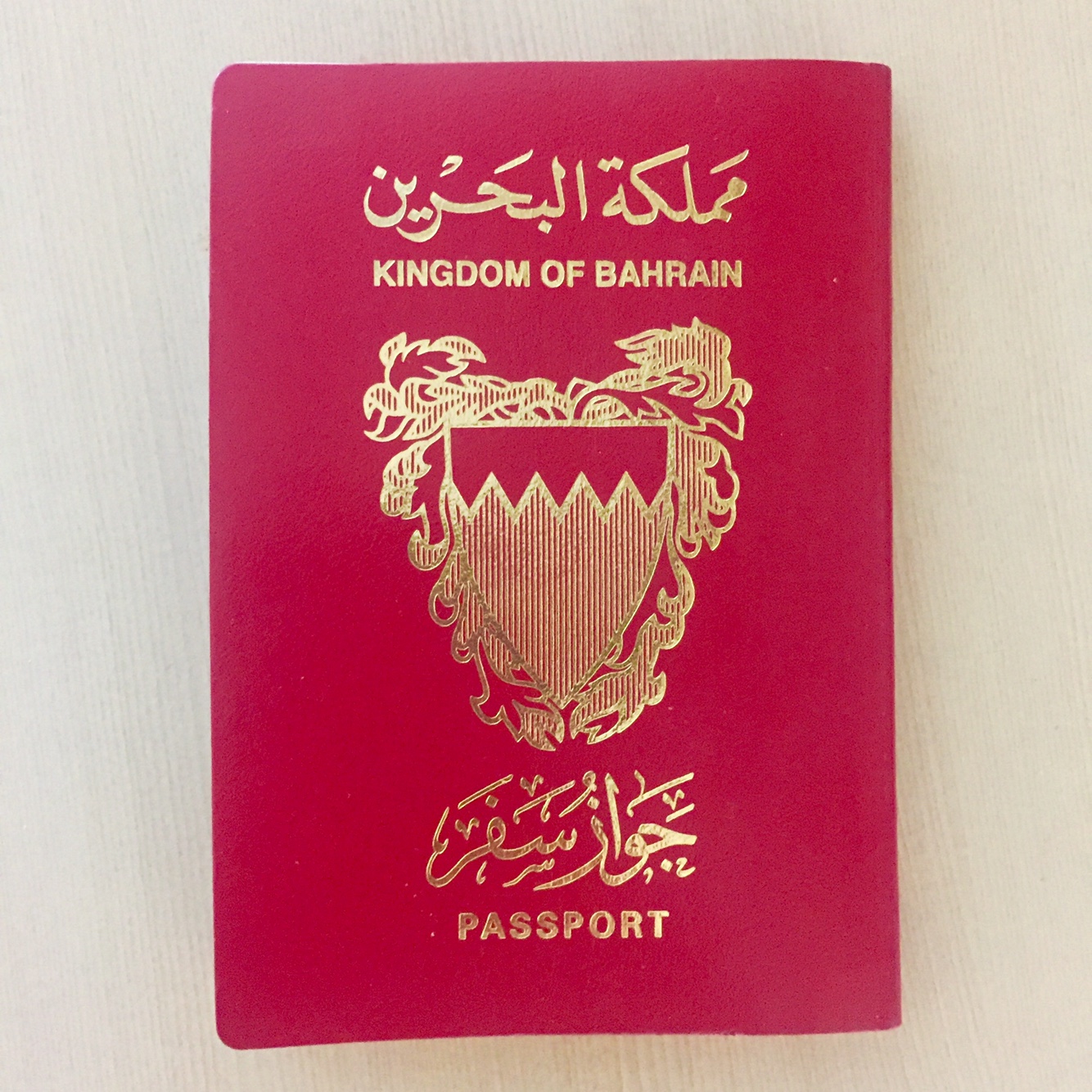Cho Kuk, South Korea’s new Justice Minister wanted to root out corruption. His first case? His own. Contributor Gabriela Bernal explains the unfolding controversy, and the grand ambitions of the latest Korean high official to be embroiled in scandal.
Anyone reading Korean news over the past few weeks will have come across his name: Cho Kuk. The newly appointed justice minister became embroiled in a corruption scandal before he even got the job and he is now facing fierce backlash from opposition parties.
Cho’s fate remains unclear. Will he be forced to resign or will the investigation against him prove fruitless? The entire country seems divided over these questions.
The corruption scandal
The scandal concerning Cho mainly revolves around two issues. The first is related to his daughter and how she allegedly received preferential treatment during the college admissions process. The allegations are that Cho’s daughter, Cho Min, was admitted to the prestigious Korea University partly thanks to a scientific paper she supposedly wrote while still a high school student on a brief internship. Cho Min’s name was listed as the first author, and all the others (medical professionals and Ph.D.s who had been researching the topic for years) followed after her name. This paper was used for her acceptance into the university, instead of the usual college entrance exam.
The story does not end there. Cho’s wife allegedly forged documents and used personal connections to help her daughter through the admissions process as well. Her actions allegedly helped Cho Min receive a total of 12 million won ($9,900) in scholarships over six semesters from 2016 through 2018.
Cho’s critics have particularly zeroed in on this issue by using Cho’s own words against him. In a Facebook post in 2013, Cho expressed how he told his daughter not to apply for scholarships while criticizing another minister for using household debt as a tool to get scholarships for his daughter. He was also quick to criticize former Park Geun-hye confidant Choi Soon-sil’s daughter of using her parents’ economic status to get entry into the prestigious Ewha University despite her lack of actual merits. Cho’s words are now coming back to haunt him.
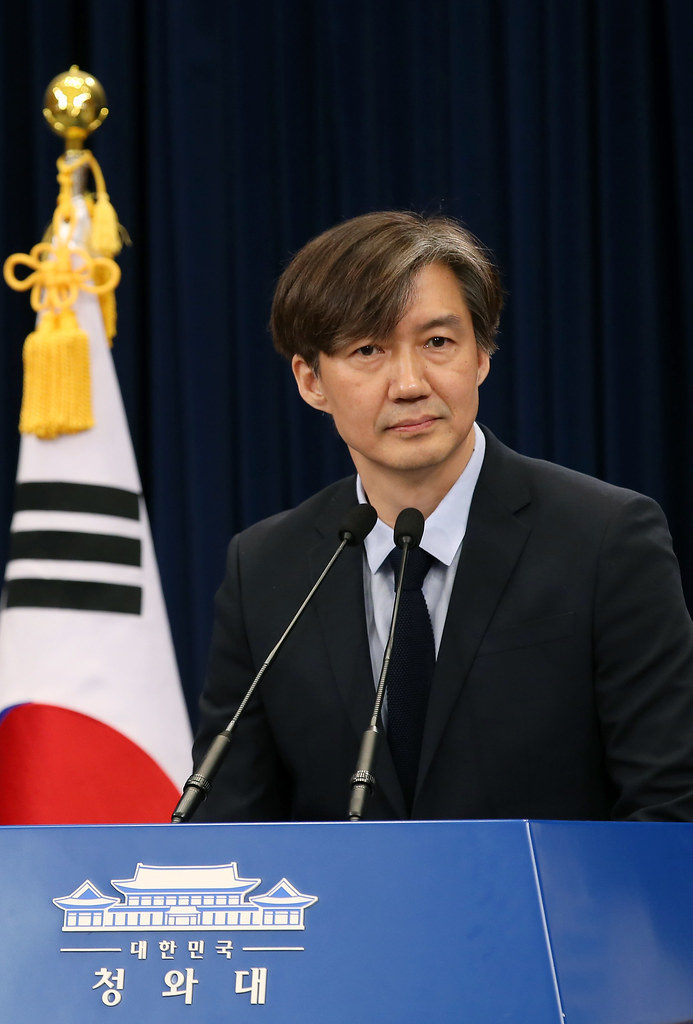
Cheng Wa Dae Press Briefing by senior presidential secretary for civil affairs, Cho Ku May 25, 2017 (Photo: Cheong Wa Dae, Seoul Ministry of Culture, Sports and Tourism Korean Culture and Information Service Korea.net)
The second issue concerns a private equity fund owned by Cho’s wife’s family in which Cho made “questionable investments.” Among other allegations, Cho is being accused of using the fund to amass wealth and transfer it to his children without paying inheritance taxes. Critics also point out that after Cho became the major shareholder, the company’s sales suspiciously more than doubled.
It also turns out that a nephew of Cho is the real owner of the private equity fund. Soon after its establishment, the fund signed a lucrative MOU with a Chinese public firm; Jiangsu Province Huakun Science and Technology Development Corporation. The deal was signed between Cho’s nephew and a Chinese representative of the corporation. Some have gone as far as to allege connections between the Chinese Communist Party (CCP) and Cho, creating rumors about the extent of their relationship. This has given way to multiple conspiracy theories about the role of the CCP, since the funding comes from China’s provincial government’s public corporation, and its ties to Cho Kuk, who is believed to be considering a future presidential bid.
Prosecution’s response
The prosecution has since started an investigation into the allegations regarding Cho and his family. A September 9 Realmeter poll showed that 52% of Koreans agreed with the investigation into Cho while 40% saw it as a move by the prosecution to prevent reform. Prosecutors in previous weeks raided over 20 locations locations linked to the private equity fund owned by Cho’s family. Cho’s wife was also indicted on charges of forging a college president’s citation for use in her daughter’s medical school application.
However, the investigation took a drastic turn when prosecutors decided to raid Cho’s home for 11 hours. It was an unprecedented search and seizure operation, and Prime Minister Lee Nak-yon and top Democratic Party figures condemned the raid, saying it went “over the line.” In a rare rebuke, even President Moon Jae-in spoke up, saying that it was important to “exercise restrained prosecution rights” to respect human rights.
Concerning the private equity fund scandal, Cho’s nephew was charged with embezzlement, breach of trust, illicit transactions, false disclosure and incitement of tampering with evidence by the prosecution. Cho’s daughter and son were questioned by prosecutors and Cho’s wife was called in for questioning on October 3. Cho Kuk himself is yet to be questioned, however. Cho said he would consider stepping down from the post if he himself is called in for questioning by prosecutors.
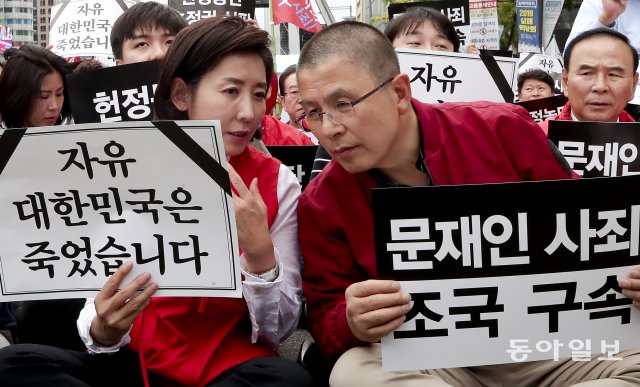
Anti-Government protestors demand the resignation of both President Moon Jae-in and his newly appointed Justice Minister, Cho Kuk.(Photo: Donga Ilbo)
Cho’s side
On September 2, Cho held an almost 11 hour-long press conference to explain his side of the story. Regarding the scholarships his daughter received, he said there was nothing illegal about them and that he did not ask anyone to give her preferential treatment. He also maintained that him and his wife did not know the details of the private equity fund. Cho apologized for his daughter’s scandal but said he would not step down and instead added: “I will do everything in my power to complete the reform mission of the Moon administration.” He also said that he would hand over his private equity fund and a school foundation to a nonprofit organization to be used for charity.
Divided public opinion
This entire scandal revolving around Cho has divided the public into two camps: those who support Cho and want the prosecution reformed and those demanding Cho’s impeachment or resignation. Young Koreans have been especially vocal about their opinions.
In fact, young people were the least supportive of the Cho nomination. The youth in Korea go through many difficulties to get into good universities and are thus very sensitive to college admission scandals. This one was no different. Massive protests by university students have been held over the past weeks. The student council of Seoul National University (SNU), Cho’s alma mater and where he teaches law, criticized him for “accepting injustice” and “dodging responsibility.” Many professors have also urged Cho to step down— most of the dissent coming from SNU.
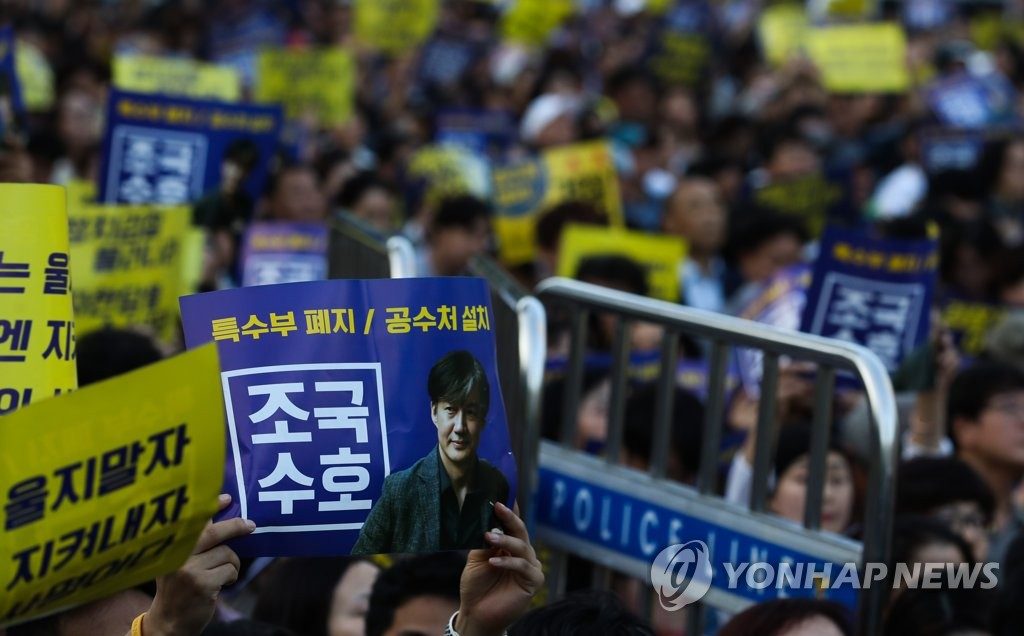
Protestors demanding prosecutorial reform hold up signs in support of Justice Minister Cho Kuk, September 29 2019 (Photo: Maeil Kyungjae)
Still, there is a significantly large pro-Cho camp. This was made abundantly clear on the weekend of September 28-29 when South Korean media outlets reported that between 1.5-2 million people came out to call for prosecutorial reform and in support of Cho. The participants called the prosecution’s investigation of Cho’s family a “coup d’etat” and voiced strong support for his reform proposal. Several ruling Democratic Party lawmakers also attended the rally. The opposition’s movement, however, was much smaller with only around 1,000 participants.
The challenge of prosecutorial reform
This entire story goes beyond Cho and his scandals, however. The bigger picture involves President Moon’s plan to reform the prosecution. Many believe that the main reason why Moon wants Cho to keep his position is because Cho holds immense authority in the initiative to remove jeokpye – or deeply-rooted evils – which the president has vowed to eradicate from society. President Moon said the following about the reform plans: “The prosecution, as an institution which wields direct authority over the people, should be disciplined in its exercise of powers.” This issue is especially important for President Moon given the fact he largely won the elections based on his no-corruption, prosecution reform-agenda.
The main goal of the reform is to balance the power structure between the police and prosecution, giving the police more investigative power which is currently seen as being too concentrated in the prosecution’s hands. The police would be given more autonomy, the right to investigate and authority to close a case, and the right to determine whether to pursue indictment or not. A plan to establish an independent body tasked with probing corruption allegations involving high-ranking government officials is also part of the reform. Supporters of these reform measures believe they would make investigations more efficient and to get rid of the current vertical power structure. The reforms are ultimately aimed at reducing the prosecution’s longstanding dominance over Korea’s criminal justice system.
Koreans have been taking to the streets for the past seven weeks calling for geomchal gaehyeok – prosecutorial reform. The size of these protests have been unprecedented. No rally on such a massive scale has taken place since the candle-light protests against the former President Park Geun-hye in 2016 and 2017. The issue is thus clearly deeply important to Korean citizens.
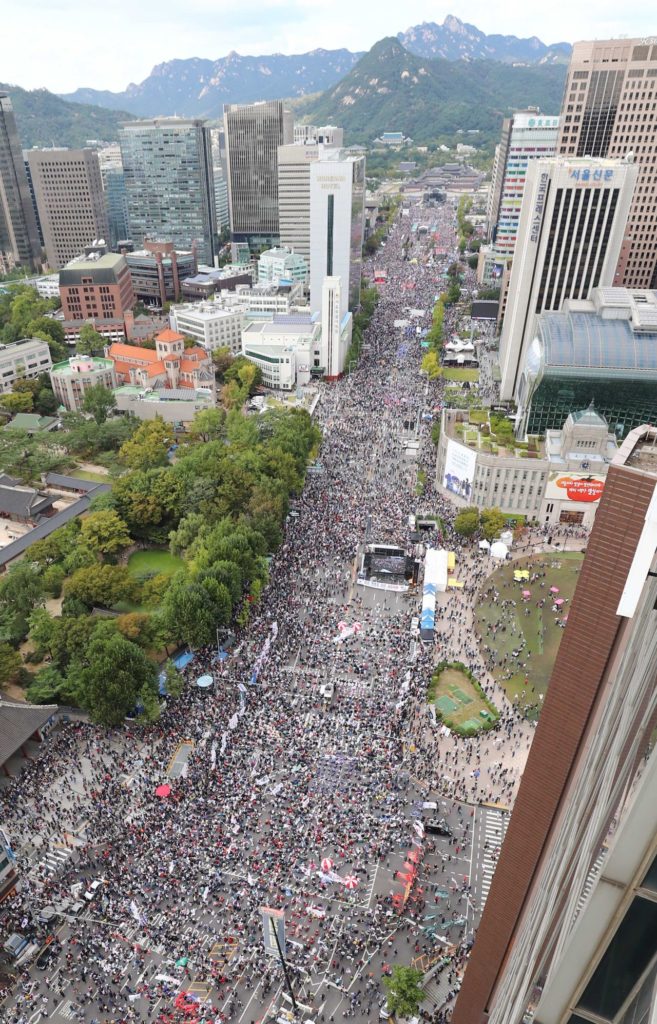
Protestors call for Justice Minister Cho Guk’s resignation in Gwanghwamun Square, central Seoul, October 3 2019 (Photo: Yonhap).
Uncertain future for Cho
It remains unclear whether Cho Kuk will remain on as Justice Minister, if he will resign, or if he will be impeached. President Moon remains strongly supportive of Cho, and so does a large proportion of the Korean public. Despite the many scandals, criticisms, and rumors surrounding Cho, not all hope is lost for him. Some even suspect he will run for president during the next elections. However, when asked in early September about running for president, Cho dismissed the idea as ridiculous. He added that he will focus on fulfilling his role as justice minister and that now is not the time to be talking about presidential elections. He added that he does not covet any higher position than the post (justice minister) he was being considered for at the time. However, one can argue that his previous position as Senior Presidential Secretary for Civil Affairs outranks his current post in terms of access to the president. The reason Cho might have wanted the post of justice minister could be to add legitimacy to his political career and boost his chances in a future presidential election campaign.
In a poll conducted on September 23-27, Cho Kuk placed third among prospective candidates for the next election. This shows that, despite opposition voices and everything that has happened since the scandal, he still enjoys significant support among the public. The enormous size of the demonstrations calling for reform and supporting him are also a testament to this.
Gabriela Bernal is a dual graduate student at Sciences Po Paris and King’s College London. Her focus lies mainly on East Asian Security, specifically on the Korean Peninsula. She also runs The Peninsula Report, a blog on Korean affairs. She has previously written for NOVAsia.
- “I Love My Body”: Hwasa and Female Empowerment in K-Pop and Korean Society - May 6, 2025
- English Fever in South Korea - February 24, 2025
- South Korea’s Medical School Expansion – Cure Worse than the Disease? - October 20, 2024

